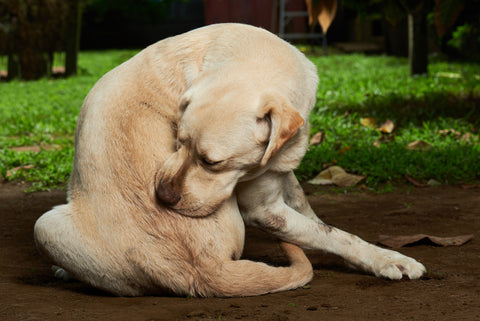Your Cart is Empty
FREE USA Shipping! 100% Guarantee!

All pet owners know their animals to scratch themselves once in a while. For the most part, there is nothing unusual about this behavior. A major reason for itchiness is dog dry skin, which can be caused by environmental and physical issues alike. During the colder months, for example, dog dry skin tends to occur more frequently, the same as it does for many people. Curing this condition depends on diagnosing it correctly and the following advice from a veterinarian or a trusted pet expert.
If your dog has dry skin and you are looking for the best dog shampoo for itchy skin, this blog is for you. Below we’ll go over the most common causes for dog itchy skin, as well as a number of home remedies you can apply to alleviate the issue for your pet.
Fleas: Fleas are one of the most common causes of dry and itchy skin in dogs. These bugs are known to lodge themselves into your pet’s fur and bite the skin. They also leave behind dirt and fecal matter. Some dogs are more sensitive to the presence of these bites and irritants than others. For these dogs, veterinary assistance will be important in fixing the problem. If your dog is itchy and evidence of fleas is present, there’s a good chance you found the cause of the problem.
Mites: Mites are parasites that can be broken up into four different types: sarcoptes scabiei, demodex canis, cheyletiella, and ear mites. While ear mites aren’t common contributors to dry skin in dogs, the other three are. Presence of these species of parasites will be evident in rashes, inflammation, and/or hair loss. Having your dog checked often for mites and having dog shampoo for itchy skin on hand will be helpful in keeping your dog healthy and comfortable.

Allergies: If your dog has dry skin and doesn't have fleas or mites, there is a good chance they have an allergy which is causing the problem. Allergies are either environmental in origin or food-based. Food allergies are common because of unhealthy ingredients or toxins in most brand recipes. Other common allergens include grains, soy, eggs, dairy, chicken, beef, and corn. Symptoms of food allergies include itchiness, redness, and dry skin, in addition to eye discharge, upset stomach, coughing and sneezing. These symptoms can appear in any order, so if one or more appear, be sure to talk to your veterinarian about switching up their diet.
Symptoms of environmental allergies are similar to food allergies, only they tend not to cause an upset stomach. Dogs can suffer from seasonal allergies just like people do, but the problem can also be caused by airborne toxins in your home or ingredients in their current shampoo or conditioner. If you take your dog to the groomer, find out what sort of cleaning materials they’re using so you can assess the threat posed to your pet.
Bacterial and fungal infections are well-known to cause symptoms like itchy skin. When bacteria get into open wounds it can inflame the flesh. Likewise, fungal infections like ringworm and hookworm can form on your pet’s skin. Unfortunately, these infections are often mistaken for dry or crusted skin, and many dogs don’t get the treatment they need soon enough. If you notice bleeding, skin lesions, or discharge anywhere on your pet, seek help immediately.
Climates with little humidity are known for causing itchiness and dry skin in dogs. Winter weather, with its cold temperatures, can also dry out the skin and make it harder for the skin to rehydrate. If you know your dog suffers from dry skin, be sure to limit their outdoors time during the winter months, and also make sure they are constantly dehydrated.

The first thing you should do if your dog has dry skin is to contact a veterinarian to at least describe the condition. If he or she doesn’t think the problem is serious, you can begin tinkering with their diet and environment to see if that has any effect on their skin. Grain-free diets and ones that are limited to a single protein source are recommended for dogs with sensitive immune systems. Make sure to switch to all-natural dog treats as well.
Beyond these measures, purchasing the best dog shampoo for itchy skin is a must if you want to take your dog’s dry skin seriously. Find a brand that uses natural ingredients exclusively, and whose ingredients include no toxins or allergens. Many popular brands include cheap filler substances and harsh chemicals known to cause or exacerbate skin problems in pets. King Komb specializes in creating the best dog shampoo for itchy skin for pets who suffer from dry skin in one or more seasons.
Remember, when it comes to buying dog shampoo for itchy skin, the gentler, the better. Reach out to the experts at King Komb today to find the product that’s best for your animal. Share your thoughts in the comment section below.Log in to King Johnnie Casino Australia to access top-tier casino games, secure deposits, and incredible bonuses.
Díky mobilní aplikaci Mostbet můžete mít přístup ke svým oblíbeným kasinovým hrám a sázkám kdekoliv a kdykoliv – mostbet casino vám přináší maximální pohodlí a zábavu.